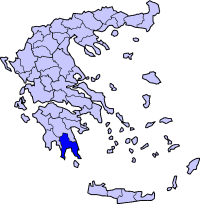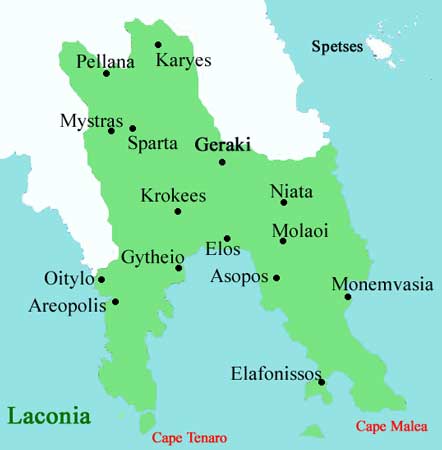|
|
Pellana or Pellene or Pellane (Greek: ἡ , Paus. iii. 20. § 2; τὰ Πέλλανα, Strabo viii. p. 386; Πελλήνη, Xen. Hell. vii. 5. § 9; Polyb. iv. 81, xvi. 37; Plut. Agis, 8), was a city of Laconia, on the Eurotas, and on the road from Sparta to Arcadia. It is also a modern municipality in Laconia, Greece. The seat of the municipality is in Kastoreio (or Kastoreion). It was said to have been the residence of Tyndareos, when he was expelled from Sparta, and was subsequently the frontier-fortress of Sparta on the Eurotas, as Sellasia was on the Oenus. Polybius describes it (iv. 81) as one of the cities of the Laconian Tripolis, the other two being probably Carystus (or, alternatively, Aegys) and Belemina. It had ceased to be a town in the time of Pausanias, but he noticed there a temple of Asclepius, and two fountains, named Pellanis and Lanceia. Below Pellana, was the Characoma (Greek: Χαράκωμα), a fortification or wall in the narrow part of the valley; and near the town was the ditch, which according to the law of Agis, was to separate the lots of the Spartans from those of the Perioeci. (Plut. l. c.) Pausanias says that Pellana was 100 stadia from Belemina; but he does not specify its distance from Sparta, nor on which bank of the river it stood. It was probably on the left bank of the river at Mt. Burliá, which is distant 55 stadia from Sparta, and 100 from Mt. Khelmós, the site of Belemina. Mt. Burliá has two peaked summits, on each of which stands a chapel; and the bank of the river, which is only separated from the mountain by a narrow meadow, is supported for the length of 200 yards by an Hellenic wall. Some copious sources issue from the foot of the rocks, and from a stream which joins the river at the southern end of the meadow, where the wall ends. There are still traces of an aqueduct, which appears to have carried the waters of these fountains to Sparta. The acropolis of Pellana may have occupied one of the summits of the mountain, but there are no traces of antiquity in either of the chapels. (Leake, Morea, vol. iii. p. 13, seq.; Boblaye, Récherches, &c. p. 76 ; Ross, Reisen im Peloponnes, p. 191; Curtius, Peloponnesos, vol. ii. p. 255.) Division of the municipality of Pellana (population 3405 in 2001)
Agios Konstantinos Agios Konstantinos is a village known before 1929 as Regozena. It was the renamed after a small church in the region.
Agoriani Agoriani is a village of Pellana. Its name is derived from Ogorjane / Gorjane a slavic name used to describe a mountain village Kastori Kastori (older Form Kastoreion) is a village named after Castor the brother of Polydeuces the sons of Leda. Before 1921 the village was called Kastania.
Longanikos or Logkanikos Pellana
 |
|
|||||||||||||||
|
|




